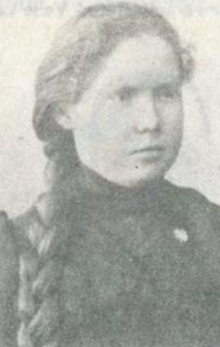Marta Lepp
Marta Lepp | |
|---|---|
 Marta Lepp, photographed as a young woman, from a 1936 book | |
| Born | Marta Kirschbaum 12 November 1883 |
| Died | 11 November 1940 (aged 56) Tartu, Estonia |
| Other names | Sophia Vardi (pseudonym), Marta Kirschbaum (after 1913), Marta Utuste or Maarda Utuste (after 1927) |
| Occupation(s) | Writer, editor, educator, political leader |
Marta Sophia Lepp Utuste (born Marta Kirschbaum; 12 November 1883 – 11 November 1940), also known as Sophia Vardi and Maarda Lepp-Utuste, was an Estonian writer, editor, educator, and political and religious leader.
Early life
Lepp was born in Varbola, the daughter of Priidik Lepp and Maria Sassi Lepp. She attended schools in Tallinn and trained as a teacher in Saint Petersburg.[1]
Career
For her revolutionary activities,[2] Lepp was imprisoned in Siberia in 1905, 1907, and 1910; she escaped at least once before her official release in 1910.[3] In 1917, she returned to Estonia, where she taught Estonian language and history in Tallinn; she was also head of a women's political organization, and was editor of a newspaper, Our Free Land.[4] She and her husband were adherents and leaders of Taaraism, an Estonian neo-pagan religion.[5][6] Her writing included short stories, an opera libretto, a novel, and a three-volume memoir.[1]
Personal life
Lepp married soldier Gustav Vladimir Kirschbaum (later known as Kustas Utuste) in 1913. Their son Reljo Utuste was born in Tallinn in 1923. Their nephew was writer Henn-Kaarel Hellat. She died in 1940, the day before her 57th birthday, in Tartu.[1] There is a collection of her papers at the University of Minnesota.[7]
References
- ^ a b c Reinart, Heili (2018-02-13). "Mässaja Marta Lepp - teekond revolutsionäärist Eesti taarausuliste ühendamiseni". Postimees (in Estonian). Retrieved 2022-07-19.
- ^ Biin, Helen; Albi, Anneli (2012-06-07). "Suffrage and the Nation: Women's Vote in Estonia". The Struggle for Female Suffrage in Europe: Voting to Become Citizens. BRILL. p. 115. ISBN 978-90-04-22991-4.
- ^ "Marta Sophia Lepp (1883-1940)". Kreutzwaldi sajand / Eesti kultuurilooline veeb. Retrieved 2022-07-20.
- ^ Loschi, Countess Maria (November 7, 1919). "Women of Esthonia Work for Freedom". The Altoona Mirror. p. 14. Retrieved July 19, 2022 – via NewspaperArchive.com.
- ^ Altnurme, Lea (2021-09-06). "The History of the Marginalization of Christianity in Estonia, 1857-2017". Old Religion, New Spirituality: Implications of Secularisation and Individualisation in Estonia. BRILL. p. 13. ISBN 978-90-04-46117-8.
- ^ Västrik, Ergo-Hart (2015-06-01). "In Search of Genuine Religion: The Contemporary Estonian Maausulised Movement and Nationalist Discourse". In Rountree, Kathryn (ed.). Contemporary Pagan and Native Faith Movements in Europe: Colonialist and Nationalist Impulses (1 ed.). Berghahn Books. pp. 134–135. doi:10.2307/j.ctt9qctm0.11. ISBN 978-1-78238-647-6. JSTOR j.ctt9qctm0.
- ^ "Collection: Maarda Lepp-Utusete (nee Marta Sophia Lepp) papers". University of Minnesota Archival Collections Guides. Retrieved 2022-07-19.
